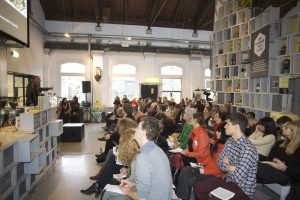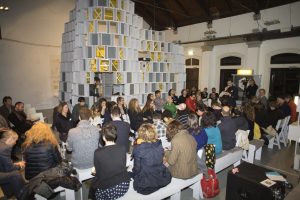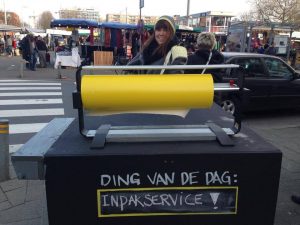The Paradox of Participation
From the 15th until the 17thof January of 2014, the symposium “FREEHOUSE: Radicalizing the Local” took place in the Wijkwaardenhuis (‘t Gemaal) in the south of Rotterdam. The Wijkwaardenhuis (house of goods and values of the neighbourhood) was a platform for cultural production that had its doors open with an active programming for 10 months in the Afrikaanderwijk (African district of Rotterdam south). The symposium, curated by Ashraf Osman, with assistance from Jeanne van Heeswijk (initiator of the project that gave birth to the WWH -FREEHOUSE) and myself, was intended to mark a transition from a physical platform that would host events, products and services from the neighbourhood, to a cooperative (Afrikaanderwijk Coop) that would trigger the local economy in a more sustained way.
The symposium was conceived in a way that it would bring international experts and high-end speakers, together with local experts, neighbours, shop owners and inhabitants. The first two days (15thand 16th), consisted of a series of four 30 minutes talks, followed each by a critical respondent that would trigger a 15 minutes discussion; each of the days, over 80 people assisted to the symposium. This part of the day would take place in the WIjkwaardenhuis, in a very distended atmosphere –contrasting with the feeling that an ‘official’ auditorium would give. After the talks, there would be a break for having lunch, which was prepared by the cooks from the Wijkkeuken van Zuid (neighbourhood kitchen from the south), one of the first structures of the Afrikaanderwijk Coop and a successful project that counts with nearly 15 members. In the afternoon, after the lunch break, the audience would be divided into four groups of 20 people and would be invited to take an active part in a workshop/discussion in four different locations around the neighbourhood (restaurants, shops, markets, bars, etc). The workshops would be lead by moderators that would have taken up the most important questions that rose during the morning talks, and would have the intention to spread the knowledge created in the WWH to the neighbourhood. After the workshops, in the end of the afternoon, there would be a general feedback session, in which everybody would be invited to take part in an open discussion. The last day of the symposium was conceived as an open deliberation day, with 10 tables of people that would discuss around the same questions (as an general assembly), and come to some conclusions (not necessarily consensual). During the three days, the furniture occupying the place would be disassembled and assembled back into new pieces to be distributed to several shops around the neighbourhood.
During the 1stday’s general feedback session, discussing about “New Organizational Forms” (the topic of the day), there was a comment from one person in the audience that sparked an interesting debate. She said that, given that we were discussing about new organizational forms in the neighbourhood, she did not understand why the community was not participating in the conversation –she put as an example the women from the kitchen. Even though it is a very valid inquiry from a person having a first approach to the project, there is two quite problematic uses of words in her comment: that of ‘the community’ and that of ‘participation’.
Lets start by the concept of ‘community’. In her comment, by putting the cooks of the kitchen as example of ‘the absent community’, there was the assumption that ‘the community’ is only that, which is different to us (us being in the side of the western European paradigm): the poorer, the folkloric, the picturesque, etc. This is the classical approach to aid policies and humanitarian projects –even maybe for many socially engaged practices in art, and it perpetuates the colonial vision with which Europe has seen the world beyond its borders, and what Renzo Martens tries to expose in his documentary film ‘Enjoy Poverty’ (2008). By participating in the symposium and taking an active role in the conversation, the person who made the comment was actually part of the community, but she did not seem to acknowledge that, why? Her comment seemed full of good intention (intention to help?), but lets remember that old Irish saying that says that ‘the road to hell is paved with good intentions’, and it is maybe more honest to assume your position within a certain group or ‘community’, than to jump to make ‘the others’ the object of your action.
The second conflictive word is ‘participation’; according to the person who made this comment, the women from the kitchen were ‘not participating in the symposium’. For problematizing this issue, I would like to refer to a speculative situation described by Bruno Latour in the book Making Things Public. He refers to a scenario in which an ‘inflatable parliament’ (devised by Peter Sloterdijk as an image of instant representative democracy –and western ideal of participation) would be dropped in a remote area of Papua New Guinea, and the natives would be forced to ‘participate’ in the extent that the people who drop it believe a democracy should –voting to elect representatives to take decisions. But what if the locals would say “No politics, please. We do not want representation. We want to keep our king or leader”? Would that be acceptable for us, within our conception of democracy and participation? In the case of the cooks and the symposium, it seems that the girl thought of participation in the sense that she was doing it: by being in an audience and after taking part in a discussion. What about cooking? Isn’t that a way of participating? Or the builders who where disassembling the furniture; weren’t they participating as well? Perhaps it is far more democratic to make things public than to expect everybody to participate in the same extent.
But there is another issue regarding that same word: if we ‘demand’ everybody to participate in the same extent, wouldn’t that be counterproductive and structurally antidemocratic? Would the person who raised the question have been happy if one of the cooks would have shared one of the workshops with her, even if it had been against her/his will? Couldn’t it be that they felt they contributed more from the role they played? Certainly, I cannot answer any of those questions, but at least I raise them as a call to get loose of assumptions we make when working with others different to us. Bottom line, it is not us who can say who can participate, in which way and into what extent; at most, we can provide spaces where people can decide what role they want to take. But in order to do that, we need a wider understanding of participation, which, in turn, demands us to widen our idea of politics. For this, it might be relevant to embrace the call of Chantal Mouffe to create an ‘agonistic public sphere of contestation’, in which people can see the different alternatives and take their own choice.




